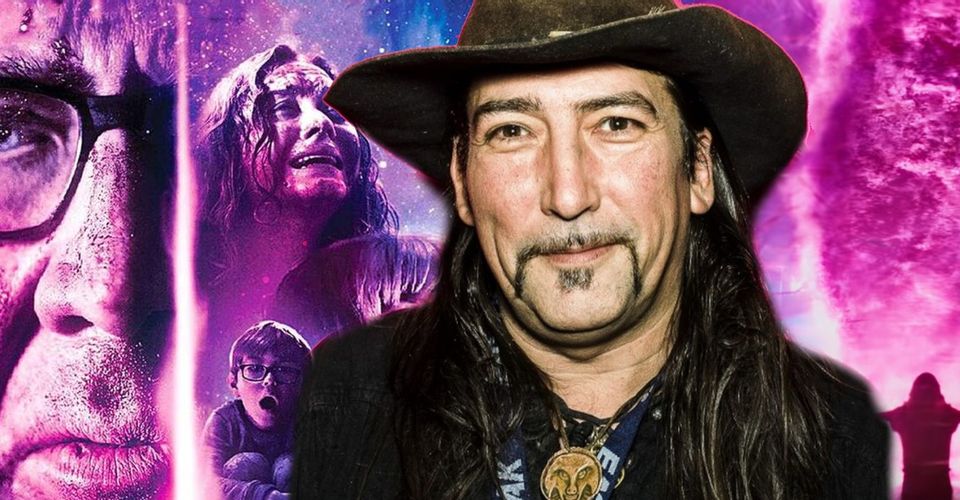Why Color Out Of Space Proves Richard Stanley’s Lovecraft Trilogy Can Work

Director Richard Stanley is in the midst of crafting the second installment in his Lovecraft trilogy which includes the 2019 cosmic horror film, Color Out Of Space, and the upcoming movie, The Dunwich Horror. When the first movie in the trilogy released, it garnered generally positive reviews, which prompted the production company—Elijah Wood’s SpectreVision—to consider the possibility of adding another Lovecraftian story to their filmography. After Spectrevision gave Stanley the green light, he immediately began working on The Dunwich Horror. But will a Lovecraft movie trilogy be successful with audiences?
In recent years, the interest in H.P. Lovecraft’s stories has been reignited in both movies and television. For instance, Jordan Peele and J.J. Abrams co-produce the 2020 HBO series, Lovecraft Country, which subverts the author’s racism that permeates through his work. His god-like monster Cthulhu made an appearance in the 2020 movie, Underwater, and the Necronomicon remains a constant element in every Evil Dead installment. He is an undeniable influence on contemporary horror creators who continually celebrate and deconstruct his works. Richard Stanley is known for being a fan of H.P. Lovecraft, which drove him towards pitching a movie adaptation of Color Out Of Space. While most adaptations attempt to take entirely from the original source, Stanley’s film crafted a unique cosmic horror story that brought in elements from various other works while remaining true to the 1927 story, “The Colour Out Of Space.”
It is common that Lovecraftian adaptations often flop upon release, which makes Color Out Of Space an anomaly in comparison. The author was known for making complex characters and monsters within the genre of weird fiction, which tends to stray away from the traditional concepts of both horror and science fiction. Regardless, Stanley was able to capture the bizarre, cosmic essence of weird fiction through a unique adaptation of one of Lovecraft’s short stories and he intends on making more—perhaps he’s found the key to success.
Why Richard Stanley Is Making A Lovecraft Trilogy

In an interview with The Hollywood Reporter in January 2020, Stanley announced that he was officially working on The Dunwich Horror. He discussed the fact that the current state of the world is reminiscent of H.P. Lovecraft’s work, and that he anticipates the second installment will be ready for release in 2021. While a portion of his drive towards crafting a trilogy based on the author’s work is due to its relevance to the current zeitgeist, SpectreVision praised Stanley for his ability to create an accurate depiction of a Lovecraftian work unlike any other. This led the director to believe that he can do Lovecraft’s adaptations better than anyone, which may or may not be true due to the subjective nature of the author’s work nearly a century after many of his stories’ initial release.
Regardless, his interest in crafting a trilogy appears to be primarily influenced by the impact the Lovecraft had on his childhood. Stanley has openly discussed the fact that his mother used to read him Lovecraft’s stories as a child, which nurtured an ongoing appreciation for the horrors he could create. It also feels like the most opportune time to release a trilogy featuring Lovecraftian stories due to their current uptick of popularity, as it appears to be at an all-time high in comparison to previous years, where movies like Re-Animator became cult classics, but never truly hit the mainstream during their initial run. As long as SpectreVision continues to provide their support for Stanley as he writes and directs these stories, it’s even likely that Lovecraftian horror could expand beyond a trilogy; there’s no shortage of weird fiction from Lovecraft and other authors.
Sometimes, it only takes one breakout hit to create a new trend, especially in the horror genre. Ari Aster’s Midsommar built off the momentum of his directorial feature debut, Hereditary, and made folk horror one of the most popular sub-genres in horror in the late 2010s, paving the way for monumental success—that has even translated to foreign horror films—in 2020. If Stanley has proven with Color Out Of Space that Lovecraft is a continually viable area for the genre to explore, this could be just the tip of the iceberg.
About The Author

















